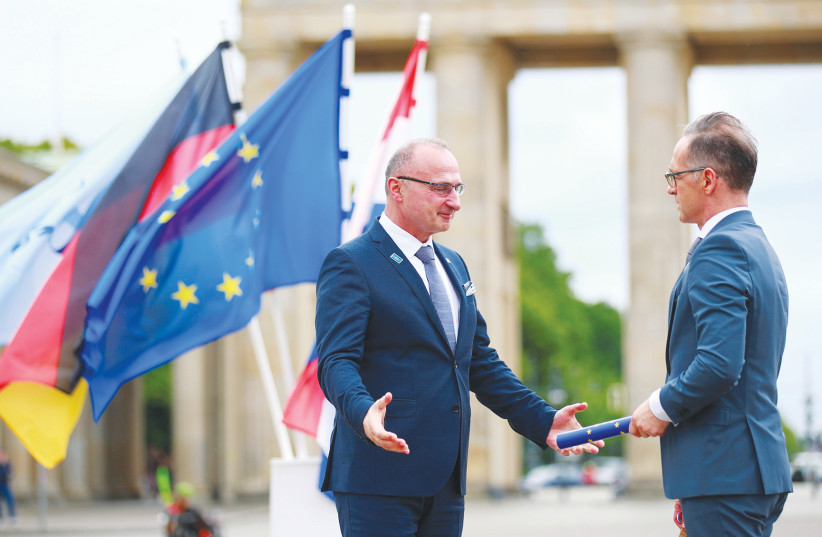 Germany’s moment has arrived to tackle European antisemitism
Germany’s moment has arrived to tackle European antisemitism
ROBERT SINGER
Germany is at the forefront of the global fight against antisemitism, which is worryingly rearing its ugly head with renewed vigor.

On July 1, Germany took on the rotating presidency of the Council of the European Union.
Of course, policy disagreements exist between Germany and Israel, not least over possible annexation. However, none of this can overshadow the deep and warm relations between the two countries, carefully nurtured over many decades. Undoubtedly, Berlin remains steadfastly committed to Israel’s security.
Furthermore, Germany continues to work tirelessly for the continued prosperity of its Jewish community and the well-being of Jewish communities worldwide. As such, Germany is at the forefront of the global fight against antisemitism, which is worryingly rearing its ugly head with renewed vigor.
As the coronavirus crisis continues to grip the world, the age-old disease of antisemitism is also rapidly infecting societies. Like COVID-19, antisemitism too easily spreads undetected. Like coronavirus, it has no respect for borders, nor does it discriminate between communities, between young and old, religious and secular, rich and poor.
Shi’ite Iran and Sunni Pakistan have a history of disagreement and animosity toward each other. Nonetheless, they are united in Jew-hatred. Religious leaders, bloggers and ordinary individuals in both countries point the finger at Jews and the State of Israel, alleging that they are to blame for the coronavirus pandemic. The same ancient conspiracy theories have been propagated recently by the far Right in the United States and also in parts of Europe.
Of course, antisemitism was already on the rise before the onset of the corona age. Figures from the Anti-Defamation League showed that antisemitic incidents in the US in 2019 reached an all-time high since tracking began in 1979. The statistics included a worrying 56% spike in antisemitic assaults. In January, the New York Police Department decided to install 100 security cameras in heavily Jewish-populated areas of Brooklyn, in an effort to deter rising antisemitic crime.
Furthermore, the scapegoating of Jews for the spread of disease is nothing new. When the Black Death overran Europe in the mid-14th century, killing millions, Jews were quickly blamed for the outbreak. The allegations against Jews poisoning wells and water sources persisted from the Middle Ages onward. Of course, the idea that Jews spread disease found a welcome home in Nazi Germany. Der Sturmer populated this antisemitic trope in print, while Joseph Goebbels’s infamous film The Eternal Jew depicted Jews as rats.
Given this context, the increase in antisemitism since the corona outbreak is perhaps no surprise. Nonetheless, a report published last week by the Kantor Center at Tel Aviv University was stark in its assessment. It concluded that the pandemic has “unleashed a unique worldwide wave of antisemitism,” with social media quickly popularizing a discourse that blames Jews and the State of Israel, alleging that they created COVID-19 and are profiting from it. While coronavirus continues to cripple the world, antisemitism is clearly very much alive and well.
ALL OF which gives Germany an exceptional opportunity to lead the response to this new wave of antisemitism, as it spearheads the EU agenda during the coming six months. In fact, it is a double opportunity. Germany also chairs the International Holocaust Remembrance Alliance, an umbrella organization of 34 countries, whose governments promote Holocaust memory and help identify contemporary antisemitism.
Having met Germany’s Foreign Minister Heiko Maas several times, I know that, like Chancellor Angela Merkel, he is a true friend of Israel and the Jewish people. Thanks to my familiarity with Maas in his previous role as justice minister, I have deep appreciation and admiration for his work to combat antisemitism, to fight Holocaust denial, to help Holocaust survivors and to ensure the welfare of the local Jewish community. I have no doubt that in his role as both foreign minister and a senior European leader, he will continue this critical work with determination.
Germany sets a wonderful example to other European countries of how to deploy education, international cooperation and political will in the fight against antisemitism.
Minister Maas, I take this opportunity to appeal to you. As you and the government you serve take the wheel of the European Union, redouble your efforts to tackle antisemitism and replicate them across the continent.
The most potent weapon you have in this struggle is education. Change can come about only through knowledge. With healthy budgets for supporting Jewish schools in Europe, Holocaust studies curriculum in non-Jewish schools, serious planning and dedication, tolerance and respect can replace hatred and bigotry. Not only can the new wave of antisemitism be repelled, but perhaps the oldest hatred itself can be consigned to history.
This is a historic mission. It is staring us squarely in the face today. If we work together, it can be achieved.
The writer is a senior adviser to the Combat Antisemitism Movement and chairman of the board of trustees of World ORT.
Zawartość publikowanych artykułów i materiałów nie reprezentuje poglądów ani opinii Reunion’68,
ani też webmastera Blogu Reunion’68, chyba ze jest to wyraźnie zaznaczone.
Twoje uwagi, linki, własne artykuły lub wiadomości prześlij na adres:
webmaster@reunion68.com
